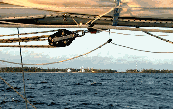|
more. It is difficult, without breaking the old rules, to accumulate money and possessions. The highest clan members are those with the pull. A low cast person might as well not bother trying.
Much of Majuro is built like a shanty town. Private homes are clad in mismatched plywood or concret block. Few have paint. The odor of inadequate sewage systems and outhouses mingles with exhaust fumes from the continuously parading traffic of cars that snake along the single road that crosses the narrow islands. The nicer homes are mostly tucked well away out of sight.
Robert Reimer is probably the local success story. He has built up a solid business with the Robert Reimers Hotel and Restaurant, a boat yard where yachts can be lifted with a crane, a supermarket and welding shop. We dropped in frequently to his Tide Table Hotel, the local drinking hole for yachtsmen, well patronized on "specials" nights when burritos or pizzas were sold.
When I was away in California and Maui, Michael rolled up the carpets below and stowed them out of the way. He lifted the engine room doors from their hinges, and set to work on the many big dirty jobs he wanted to get stuck into. By the time I returned he had accomplished most of the tasks he had set out to do. There was little to keep us in Majuro. After clearing out on the 11th of February we sailed down the lagoon to anchor overnight at Anawata, one of the small sandy motus near the entrance, where walked ashore, swam and relaxed.
The next morning at dawn Calalin Pass had a deep swell running through it. As we passed a marker buoy Michael remarked that the bottom had shoaled to only five fathoms. At that very moment the fishing reel screamed and I jumped aft to get it. When nearly all the line had wound off I gingerly slid on the brake expecting the gear to break under the enormous strain. I could not reel the fish in, but left it fighting until we had cleared the last marker, by which time it surfed on its side, mostly spent. Michael hauled it in while I readied the gaff. It was a large dog-toothed Tuna, the first we had ever landed, a delectable white fleshed fish, excellent for sashimi, known to be free of the threat of ciguatera.
We had expected to arrive at dawn 48 hours out from Majuro, but the wind was strong and pushing from astern. By 9:00 PM the second night out, Kwajalein, 20 miles away, was visible on radar, despite us having reduced sail considerably to keep our speed down. The rest of the night we coasted under staysail about five miles offshore, and then circled up to Gea Passage in the gray pre-dawn light.
KWAJALEIN 14 February 2003
To go to Kwajalein you need a sponsor. Kwajalein is a U.S. military base that is mostly staffed by civilian technocrats contracted to a company that manages the various projects on the island. The Sponsor makes sure that his guest knows the rules of the base, and does not infringe them. Despite the paperwork acrobatics, cruisers are made very welcome on the island. Like most out-of-the-way places, they are somewhat starved for new company.
Alongside the dock in a protected harbor police arrived
|
|





